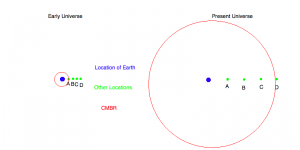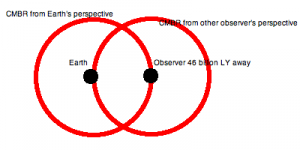-
Posts
6185 -
Joined
-
Last visited
Content Type
Profiles
Forums
Events
Everything posted by Sisyphus
-
Plasma is just ionized gas. It isn't necessarily hot, though the most straightforward way of producing it is making gas very hot. Fire is a particular chemical reaction - fuel combining with oxidizer and releasing heat, which in turn can ionize some of the gas around it, producing plasma. So no, plasma is not a fire. The entire surface of the sun is plasma (because it's so hot), but there is no fire there.
-
The BB is not 13.7 billion LY away. It happened 13.7 billion years ago, everywhere. When the universe became transparent after that, the light we call the CMBR was emitted, from everywhere. We could still see it today by looking at light that has traveled for 13.7 billion years. However, the only light that we can see that has been traveling for 13.7 billion years is from a spherical region that is currently 46 billion LY away, and was 40 million LY away at the time it was emitted.
-
The Big Bang would be a universal event. It doesn't have a range. It's everywhere at once. No, I meant million. Light emitted at the time of the CMBR has traveled fro 13.7 billion years, and reached a point that was 40 million LY distant at the time of emission and 46 billion LY distant at the time of reception.
-
It has a radius from our perspective. It isn't actually a sphere of stuff. An observer located at some point on our sphere of CMBR would see CMBR at our location, and also be centered inside a sphere. The BB was everywhere, not in a hollow shell around us. Suppose that today, simultaneously in our reference frame, every star in the universe turned green. From then on, we would observe an expanding ball of green centered on ourselves, and so would every observer in the universe. Whether the metric of space increased, decreased, or stayed constant during that time would not change that fact.
-
Yes, and? The farther in the past you go, the greater the portion of the universe you are seeing. A particular portion of the universe was smaller farther in the past. The portion of the universe "inside" the CMBR has a radius of 46 billion LY. That portion at the time the CMBR was emitted had a radius of 40 million LY.
-
Light travels as waves, and those waves come in different wavelengths. The eye has several different kinds of receptors, which are most sensitive to different ranges of wavelength. You perceive different colors depending on the ratio of how strongly these different receptors are stimulated.
-
There is nothing contrary about this. To go "back in time" you have to go a farther distance away. There are more things far away than close, by simple geometry. We see what we would expect to see. (Which makes sense, since the theory is based on observations.) Superluminal motion isn't part of it. Objects do recede at speeds greater than C, but that would be true of any expansion whatsoever. (And it is in accordance with relativity, not contrary to it.) The "sphere" we observe was indeed much smaller when it emitted the light we are seeing than it is "now." The CMBR that we now see was emitted 40 million LY from us. The light has taken 13.7 billion years to reach us, and that matter is now about 46 billion LY from us.
-

Has evolution theory got religion?
Sisyphus replied to John Jones's topic in Evolution, Morphology and Exobiology
I'm aware that you meant them differently, but you were arguing as if that wasn't the case, hence equivocation. Trace the argument: Mr Skeptic: Perhaps you could copy memories. cypress: You only think that because of an unreasonable faith in materialism. Mr Skeptic: It's not faith and it's not that unreasonable, since everything we know of so far is materialistic. Like computer files. cypress: No they're not! [metaphysical account of the physical activity of hard drives] In context, it has to mean the same thing, or else your argument makes no sense except as pedantic contrarianism. The thread is a bit confused so I'll assume you're not doing it a purpose. If you were, it would be quite the lawyer trick! -
I suppose the implication is that it has to be one or the other, but it does not. For example, not every grammatically correct statement has meaning, even if it seems like it does. You could also make the argument that it is simply false, because every statement implies its own truth. "It is true that we are on SFN," "it is a true statement that we are on SFN," or "this statement is true and we are on SFN" contains no more information than "we are on SFN." So the statement is equivalent to "this statement is true and this statement is false." This takes the form of "P and ~P," which is simply self-contradictory and false.
-

A thread at rationalskepticism.org on gay marriage
Sisyphus replied to Severian's topic in The Lounge
Wow, that's a steaming mess of a thread, and Severian was definitely treated unfairly. Only eventually did anyone get around to debating you instead of what they assumed your ulterior motives were, or what they seemed to think you said apparently without reading it. I agree with Mr Skeptics suggestion. That thread was poisoned from the start and hopelessly confused by the time you joined it. Start a new one, nonconfrontationally as possible, and see what happens. Something like "Should the state be involved in marriage?" Don't call anyone out for behavior in the old thread, don't make it about religion/atheism, don't imply hypocrisy on the part of anyone. Just a polite, carefully laid out proposal, and see what happens. -

Has evolution theory got religion?
Sisyphus replied to John Jones's topic in Evolution, Morphology and Exobiology
These two quotes taken together seem to imply you think it is impossible to copy computer files. You might not be able to copy a human mind because it might not be "reducible to material," but then computer files are also not "reducible to material." Since you obviously don't believe copying files is impossible, then you must mean this phrase in two different senses, and you are equivocating such that it is no longer clear what your actual point is, if anything. -

How to conduct rational argument in the logical sciences
Sisyphus replied to John Jones's topic in Science Education
http://en.wikipedia.org/wiki/Modus_tollens -
It literally means quantum. The study of physics at the level of discrete entities, as opposed to continuous values of classical physics.
-
Looks like a brand or stamp. Origin?
-
A clone would unquestionably be a person, the way I use the word "person." That a single celled organism (zygote) could be considered a person but a fully conscious adult human could not be is a really confused philosophy, IMO.
-
That does seem to be the real driver of this debate. My uncle is a Catholic priest, and he's said pretty much that. (Though the argument began while driving through a national park, with "look at all this 'overpopulated' empty space God has given us.") It's not just Catholics, obviously, or even just religious people (though it is mostly). It's between long term thinking, and short term thinking on the basis of "it's all over soon anyway." And what if we don't believe that we're going to be rescued like that? "Well, there's plenty of room in Hell too," he said.
-
Yes, and every living human being "has" about 6.6*10^22 cubic light years in the observable universe. The problem is that how tightly you can physically stack human bodies in a place is not the measure of whether it's overpopulated. It's how many you can sustainably support with a decent quality of life. And that's not even considering whether it is a good thing to wipe out every natural environment on Earth to support our continued existence.



